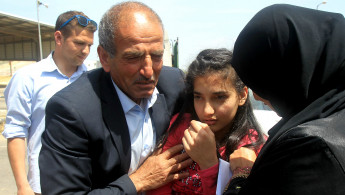Israel releases youngest Palestinian prisoner after two months arrest
Wawi was handed over to Palestinian authorities at Tulkarem crossing point into the northern West Bank.
She then travelled to her family home near Hebron in the south of the territory, where she was greeted by the city's governor and dozens of well-wishers with hugs, tears, songs, flags and speeches.
She was arrested, wearing her school uniform, on February 9 at the entrance to a Jewish settlement in the occupied West Bank for allegedly carrying a knife in her school bag.
A wave of attacks in the region has left 28 Israelis dead since last October, while 201 Palestinians have been killed over the same period.
Under a plea bargain with Israeli military prosecutors, Wawi pleaded guilty to attempted murder and possession of a knife and was sentenced to four months in an Israeli prison and a further six-week suspended sentence.
"She is the youngest Palestinian girl ever imprisoned," her lawyer Tariq Barghouth posted on Facebook.
 |
She is the youngest Palestinian girl ever imprisoned |  |
Barghouth said Wawi's defence team had asked the military court for her early release and it agreed.
According to Israeli military law, minors from age 12 can be charged, uniquely in the world according to United Nations children's agency UNICEF.
Israel's military has used unnecessary force to arrest or detain Palestinian children as young as 11.
Around 6,000 Palestinian children have been detained by Isaeli forces between 2010 and 2015.
"Israeli forces' mistreatment of Palestinian children is at odds with its claim to respect children's rights," Human Rights Watch's Middle East director, Sarah Leah Whitson, has said.





 Follow the Middle East's top stories in English at The New Arab on Google News
Follow the Middle East's top stories in English at The New Arab on Google News
![The UAE is widely suspected of arming the RSF militia [Getty]](/sites/default/files/styles/image_330x185/public/2024-11/GettyImages-472529908.jpg?h=69f2b9d0&itok=Yauw3YTG)
![Netanyahu furiously denounced the ICC [Getty]](/sites/default/files/styles/image_330x185/public/2024-11/GettyImages-2169352575.jpg?h=199d8c1f&itok=-vRiruf5)
![Both Hamas and the Palestinian Authority welcomed the ICC arrest warrants [Getty]](/sites/default/files/styles/image_330x185/public/2024-11/GettyImages-2178351173.jpg?h=199d8c1f&itok=TV858iVg)